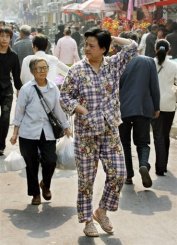[Update: the suit was rejected, as a commenter points out.]
This blog was home to a spirited argument some months ago regarding the government’s efforts to bribe and/or silence parents of the children killed in the Sichuan earthquake who were demanding accountability. Now 57 of those parents are trying to have their day in court, but it is not at all clear whether the court will hear them.
A group of parents whose children were among the 127 killed in the collapse of an elementary school during the May earthquake that devastated western China have confirmed that they filed a lawsuit against government officials and a construction contractor. The lawsuit is the first filed by grieving and angry parents who say shoddy construction cost the children their lives.
Radio Free Asia reported the lawsuit in early December, but China’s official news media have not mentioned it. This weekend, the parents confirmed the filing in telephone interviews. They said the court has yet to tell them whether it will hear the case.
The lawsuit was filed on Dec. 1 in a court here in the city of Deyang, in Sichuan Province, the region hit hardest by the May 12 earthquake, which left 88,000 people dead or missing. Up to 10,000 schoolchildren were killed as some 7,000 classrooms and dormitory rooms collapsed across the quake zone, according to government estimates.
That they have gotten this far is pretty remarkable, though I doubt they will get much farther. Possibly all of them have signed an agreement with the government not to speak about the issue. The only bright side of the story is that the Chinese people are far more willing to speak out than they were just a few years ago, and they are beginning to see their right to protest and complain as a given.
In similar legal action, parents in three provinces filed lawsuits this fall against dairy companies after tens of thousands of children across China fell ill and at least four died from drinking milk and baby formula tainted with a toxic chemical called melamine. Local officials had been involved in covering up the poisonings, and judges have so far declined to hear any lawsuits.
After the earthquake, the central government assigned a committee of experts to look into the school collapses, but the committee has yet to issue a final report. In September, an official from the committee, Ma Zongjin, said at a news conference in Beijing that a rush to build schools during the Chinese economic boom might have led to shoddy construction that resulted in the student deaths. He said more than 1,000 schools had one of two major flaws — they were built on the earthquake fault line or they were poorly constructed.
Government officials at all levels have tried to suppress discussion of the school collapses.
So it’s a maddening situation, where you can protest, but only so much. Rule of law and accountability are still abstractions. You can complain and sue and speak up on the Internet and even in the media, and the government may actually investigate (which is why I bolded the text above – in the earlier thread there was a lot of skepticism of whether there would be any investigation at all). But when it comes to demanding accountability, don’t get your hopes too high. It’s great that these parents can sue the government. Until the courts start to act and hold officials accountable for their actions, however, it’s little more than a gesture.
Note: If you want to be reminded of the very human nature of the school tragedy in Sichuan, please revisit this famous post. I still get chills when I look at those faces.

Comments